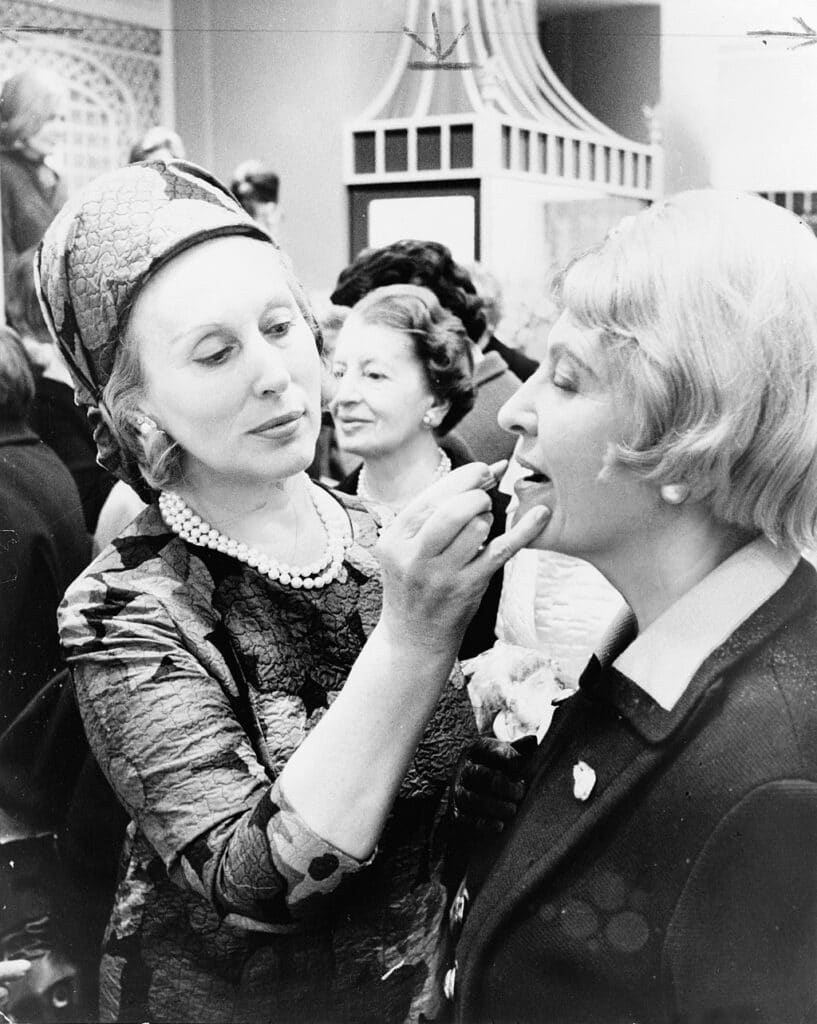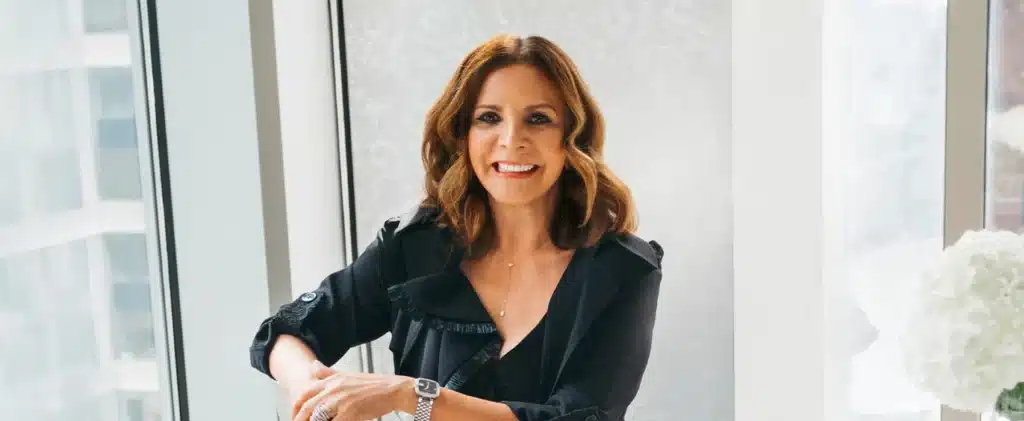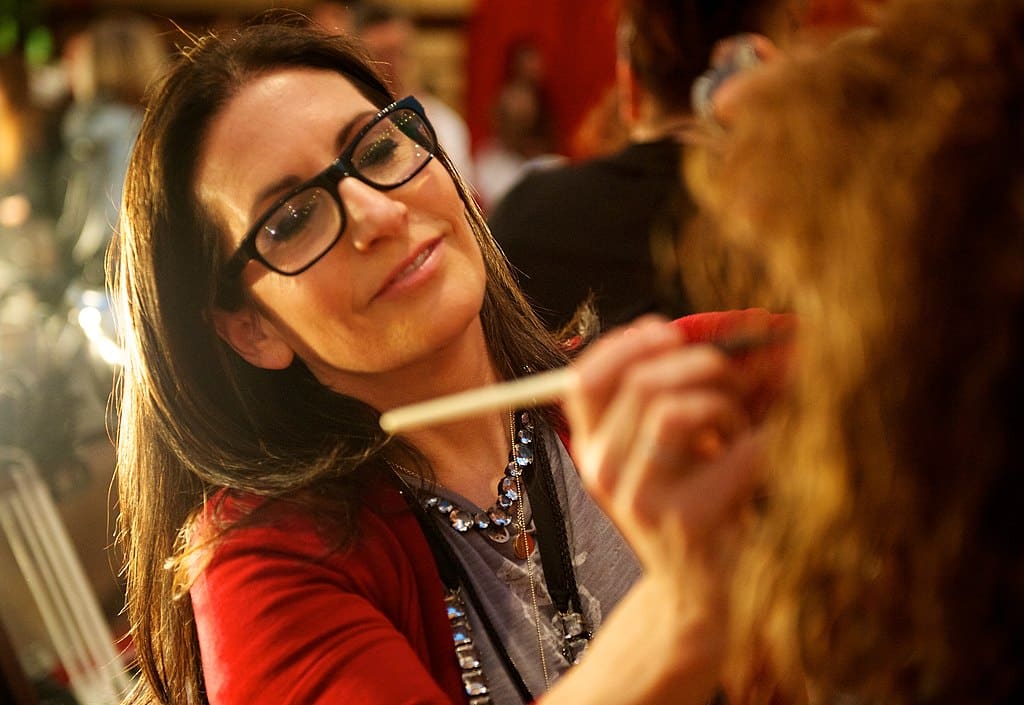
Beauty might be only skin deep, but the origins of some of the world’s most iconic beauty brands go much deeper, rooted in heritage, identity, and bold innovation. From the bustling streets of Queens to the luxe salons of Beverly Hills, Jewish entrepreneurs have long played a transformative role in shaping the beauty industry. Armed with vision, resilience, and, of course, a healthy dose of chutzpah, these trailblazers didn’t just create products — they built empires that redefined beauty standards and made us rethink what it means to feel confident and beautiful.
Here are eight visionary companies in the beauty industry — new and tried and true — that you may not have known were founded by Jews.
Estée Lauder
Estée Lauder is revered as a pioneer and powerhouse in the global beauty industry. Celebrated for innovation, elegance, and science-backed skincare, the brand holds a top spot in the world of prestige beauty.
But this global empire started with humble roots.
Born Josephine Esther Mentzer in Corona, Queens, Estée Lauder was the daughter of Jewish Hungarian immigrants. She grew up in a crowded household with eight siblings and spent her early years working in the family’s hardware store, where she developed an eye for merchandising, a love for business, and a knack for entrepreneurship.

By 1946, she officially launched the Estée Lauder brand with just four products crafted by her chemist uncle. Just seven years later, in 1953, she revolutionized the fragrance world with Youth-Dew, a bath oil that doubled as a perfume and redefined how women wore fragrance.
It wasn’t just her products that set her apart — she was also a marketing trailblazer, introducing free samples and “gift with purchase” promos that became industry standards. To market Youth-Dew, Lauder’s strategy was to empower women to buy the product for themselves at a time when fragrance was mostly gifted by men. Her innovative marketing helped the brand grow into a global empire, eventually spawning new lines like Clinique and Aramis. Even as the business expanded, Lauder stayed closely involved in product development and strategy until 1995, stepping away as one of the most iconic names in beauty.
Her legacy lives on not just through her enduring brand, but through herf philanthropy, which is notably carried on by her family, particularly her son and heir to the Estée Lauder fortune Ronald S. Lauder. A former U.S. ambassador, he has made significant contributions to Jewish and Israeli organizations and helped found multiple Jewish schools throughout Europe.
Moroccanoil
If you’ve ever experienced dry, damaged, or brittle hair, chances are you’ve tried using a product infused with argan oil. Rich in essential fatty acids, vitamin E, and antioxidants, argan oil has become a staple in haircare, and much of its popularity in the Western market can be traced back to Jewish entrepreneurship. Brothers Erik and Mike Sabag were among the first to bring the magic of argan oil to a wider audience. Inspired by a gift from their mother after a trip to her native Morocco, Mike began experimenting with the oil in 2003. The brothers soon started selling their early formulas in and around Tel Aviv, laying the groundwork for what would become Moroccanoil.

Moroccanoil’s big break didn’t come, however, until 2008, when Chilean-Canadian investor Carmen Tal discovered the benefits of argan oil during a visit to Israel. After experiencing a transformative hair treatment in a Tel Aviv salon, she and her then-husband, Ofer Tal, acquired the distribution rights for North America. The product’s commercial success in the U.S. led them to purchase the entire company and relocate production to a new facility two hours north of Jerusalem in Ma’alot Tarshiha.
Despite its widespread acclaim, Moroccanoil has faced backlash from anti-Israel activists. Since its products are labeled “Made in Israel,” the brand has been targeted by the Boycott, Divestment, and Sanctions (BDS) movement, as well as the Canadian group CJPME (Canadians for Justice and Peace in the Middle East), which has called for consumer boycotts.
Still, the brand continues to embrace its roots. Moroccanoil products are marked with (בס״ד) (‘B”SD,’) the Aramaic acronym for ‘With the help of heaven,’ reflecting the founders’ Jewish roots. In traditional Jewish practice, בס״ד is often written at the top of documents or letters to invite divine presence and express gratitude before beginning any task, a quiet yet powerful gesture of faith.
Starface
If you’re over 25 and have heard of Starface Skincare, congrats — you’re officially cool. For the rest of us alte kaker millennials wondering what the hype is about, here’s the scoop: Starface is a buzzy skincare brand launched in 2019 that became a Gen Z favorite thanks to its iconic star-shaped pimple patches and a refreshingly open approach to acne. Rather than hide breakouts, Starface encourages users to wear them like badges of honor — cute, neon-colored ones at that.
The brains behind the brand is Julie Schott, a longtime beauty editor-turned-founder with a sharp sense of humor and a knack for flipping beauty norms. She openly discussed her decision to not undergo a rhinoplasty, challenging the notion that a “Jewish nose” is something to be fixed. In her words, she chose not to get a nose job — a procedure, unfortunately, considered a rite of passage in some Jewish communities — as she writes about in Cosmopolitan.
Schott also reflected on growing up in the “Frizz Ease generation,” when flat-ironing and taming curls was seen as essential to fitting in at social events. Now, with Starface, she’s helping redefine what beauty looks like: messy, honest, and sometimes sticker-covered. Her candidness and wit have made her a standout voice in the beauty world, resonating with those who appreciate authenticity and humor.
Il Makiage
Leave it to Israelis to apply AI and machine learning to create a truly one-of-a-kind makeup company. That’s the magic of Il Makiage, a brand that blends beauty with brainpower.
Originally founded in 1972 by Israeli-born, New York-based makeup artist Ilana Harkavi, Il Makiage was a pioneer in professional-grade cosmetics, offering an expansive, gorgeous color range that inspired many other brands to follow suit. Harkavi’s work influenced industry icons like Bobbi Brown and François Nars, and her products were favored by celebrities including Madonna and Naomi Campbell, cementing Il Makiage’s reputation as a trailblazer in pro-level glam.

In 2018, Israeli siblings Oran Holtzman and Shiran Holtzman-Erel revitalized Il Makiage, transforming it into a tech-driven, direct-to-consumer beauty company that utilizes AI and machine learning to deliver hyper-personalized product recommendations.
Holtzman-Erel, who served as a sergeant in the Israeli Air Force and studied at Tel Aviv University, brings a unique blend of discipline and innovation to her role as Chief Product Officer. Oran, with a background in accounting, complements her vision as CEO of Oddity Tech Ltd., the Israeli-founded consumer tech platform they founded together.
Oddity builds and scales digital-first beauty and wellness brands, leveraging proprietary technology, including AI-based product matching and molecule discovery, to disrupt traditional beauty retail. The company actively recruits talent from elite Israeli technology centers, including the Israeli Defense Forces’ Unit 81 — its Special Operations Division’s technology unit — infusing its research and development efforts with cutting-edge expertise. Il Makiage and anti-aging skincare brand SpoiledChild lead Oddity’s portfolio, showcasing the siblings’ commitment to blending Israeli innovation with the beauty industry.
E.l.f.
Walk in for a $6 blush, walk out with enough makeup to stock Gal Gadot’s photoshoot for VON Magazine. Surprising? Not really. Sound familiar? Thought so.
E.l.f. Cosmetics — short for eyes, lips, and face — was founded in 2004 by Scott-Vincent Borba and Joseph “Joey” Shamah, after the latter noticed his wife was dropping serious cash on makeup and wondered: Why do good products have to cost so much? With support from his dad, Alan Shamah, they launched e.l.f. online with prices starting at just $1, making quality beauty way more accessible, long before that was a trend.
The key to e.l.f.’s success? Skip the fancy packaging, big ad budgets, and celebrity campaigns — sell directly to consumers, and focus on high-volume, no-frills products that get the job done. The result is a cult-favorite brand known for delivering quality and performance without the markup.
Behind the business is a proud Sephardic Jewish family with deep Brooklyn roots. Alan Shamah is a prominent member of the local Syrian Jewish community and sits on the board of the Sephardic Community Alliance. The family’s connection to Jewish education runs deep, too — Alan serves as a trustee at the Yeshivah of Flatbush, where extended family members Sheila and Norma Shamah also play active roles. Sheila is part of the school’s Ladies Auxiliary, and Norma heads up its Capital Campaign.
Essie
Before “Ballet Slippers” was worn by actual royalty and “Wicked” redefined sultry sophistication, Essie Weingarten was a nail-obsessed Jewish girl from Queens, New York, with a suitcase full of polish and a dream to leave the beauty world tickled pink.
Growing up before nail salons were a staple, Weingarten’s introduction to nails was unconventional. In the absence of dedicated spaces for manicures, nail technicians would visit beauty and hair salons, offering their services to women while they got their hair done. In a personal reflection, Weingarten shared, “…that’s how I fell in love with nails. If I was good, my mother took me to the salon on Saturday.”
Armed with a dozen unconventional shades, she flew to Las Vegas in 1981, pitching her polishes to casino workers who frequently showcased their hands. She went door-to-door to local spas and beauty salons, selling this first collection. Her instincts paid off: within a year, Essie Cosmetics was in 10,000 salons across the U.S., and by the following year, the brand expanded internationally.
But Weingarten didn’t just expand the color palette—she changed the game. Her long-lasting, chip-resistant formulas appealed to both professionals and consumers. Her approach transformed the nail care market, setting new standards for quality and innovation and turning Essie into a household name.
Beyond her business achievements, Weingarten has remained connected to her Jewish roots. She has spoken at Jewish Federation events in Nevada, engaging with the community and supporting its initiatives.
However, Essie Cosmetics has also been the subject of political scrutiny. Since its acquisition by L’Oréal in 2010, the brand has been included on boycott lists by the BDS movement. Critics point to L’Oréal’s operations in Israel, including a factory in Migdal Ha’emek, and products containing Dead Sea minerals, as reasons for the boycott.
Bobbi Brown and Jones Road
Credited with revolutionizing the beauty industry with “natural looks,” Bobbi Brown started as a Jewish girl from the sleepy suburb of Wilmette, Illinois. After earning a degree in photography and theatrical makeup from Emerson College, Brown moved to New York City to work as a professional makeup artist. She quickly became known for her natural looks, which were in stark contrast to the hyper-glam, contour-heavy beauty looks of the 1980s.

Brown quickly made a name for herself by doing something radically simple: embracing what women actually look like. Her understated, skin-toned palettes and minimalist aesthetic felt like a breath of fresh air in a world obsessed with bold eyeshadow and overdrawn lips. In 1991, she launched Bobbi Brown Cosmetics with a line of 10 lipsticks that matched natural lip tones, and beauty was never quite the same.
Brown has spoken openly about her Jewish identity and how it shaped her personal and professional life. In interviews, she has discussed the cultural pressures faced by Jewish women, particularly regarding their appearance and mainstream beauty ideals. For instance, she recounted that her mother once offered to pay for a nose job during her youth — a not-uncommon gesture among Jewish families at the time, aiming to help their children assimilate. Brown declined the offer, choosing instead to embrace her features. This decision influenced her philosophy in the beauty industry, where she became a proponent of natural beauty and self-acceptance.
That ethos — celebrating individuality and redefining beauty standards — became the cornerstone of her brand and legacy. After she sold Bobbi Brown Cosmetics to Estée Lauder in 1995, Brown stayed on as Chief Creative Officer until 2016, when she stepped down. Four years later, and on the exact day her non-compete expired in October 2020, she launched a new venture: Jones Road Beauty, a clean, minimalist makeup brand that reflects her signature approach to beauty.
Throughout her career, Brown has maintained a connection to her Jewish heritage through philanthropy and public advocacy. She has been involved with organizations such as the Jewish Women’s Archive and has participated in events that spotlight Jewish innovation, entrepreneurship, and leadership across industries, including beauty.
OPI
Before OPI was synonymous with witty polish names and salon-quality formulas, Suzi Weiss-Fischmann was just trying to help out at the family business. After relocating to Los Angeles in the early 1980s, the Hungarian-born entrepreneur joined her brother-in-law George Schaeffer‘s dental supply company, Odontorium Products Inc. (OPI). But something unexpected caught her eye: nail technicians were repurposing OPI’s dental acrylics for manicures. Sensing a major opportunity, Suzi and George shifted gears and transformed the company into a nail care brand.

In 1989, Suzi launched OPI’s first nail lacquer line, introducing 30 vibrant shades with playful names like “I’m Not Really a Waitress.” These cheeky, irreverent monikers revolutionized the nail industry by making polish names fun and memorable for consumers. Under Suzi’s creative direction, OPI became a global powerhouse, known for its studio-quality products, trendsetting colors, and collaborations with celebrities, movie studios, and fashion designers. In 2010, the brand was acquired by Coty Inc. for nearly $1 billion, solidifying its status in the beauty world.
Born in Hungary in 1956 to Holocaust survivors, the “First Lady of Nails” immigrated to Israel as a child before settling in the U.S. as a teenager. She first lived in New York before settling in Southern California in the 1980s. Suzi is actively involved in philanthropic efforts, having previously served on the Board of Directors of the Abraham Joshua Heschel Day School, the Board of Trustees of Jewish Women International, and participating with the USC Shoah Foundation to preserve Holocaust memory and promote education.


